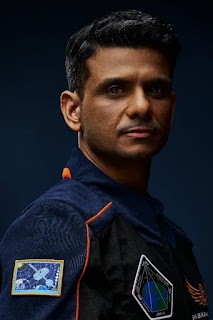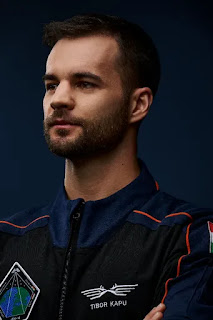Axiom Mission 4 (AX-4)
Axiom Mission-4
What is Axiom?
 |
| Axiom Mission Crew |
Axiom Mission 4 (Ax-4) is a private human spaceflight mission to the International Space Station (ISS), organized by Axiom Space in collaboration with SpaceX and NASA. Scheduled for launch no earlier than June 8 or 10, 2025, from NASA’s Kennedy Space Center in Florida, the mission will use a SpaceX Crew Dragon spacecraft to carry a four-person crew for an approximately 16-day stay on the ISS. The crew, led by former NASA astronaut Peggy Whitson, includes astronauts from India (Group Captain Shubhanshu Shukla), Poland (Sławosz Uznański), and Hungary (Tibor Kapu), marking the first government-sponsored International Space Station (ISS) missions for these nations.
Key Objectives:
Scientific Research: Conducted ~60 microgravity experiments, primarily in biomedical sciences, sponsored by international partners.
International Collaboration: Foster global participation in commercial spaceflight with representatives from India, Poland, and Hungary.
Commercial Space Development: Advance Axiom Space’s goal of expanding access to low Earth orbit and supporting future private space stations.
Operational Experience: Enhance expertise in commercial crewed missions for future endeavors.
History:
Ax-4 is the fourth mission in Axiom Space’s series of private ISS missions, following Ax-1 (2022), Ax-2 (2023), and Ax-3 (2024). Initially planned for October 2024, the launch faced delays to May and then June 2025 due to weather and preparation needs. The crew finished training at NASA’s Johnson Space Center in April 2025. This mission supports NASA’s efforts to promote a commercial space economy as the International Space Station (ISS) approaches its planned decommissioning in 2030.
Crew Details:
The Axiom Mission 4 (Ax-4) crew consists of four astronauts, representing a mix of experienced spacefarers and first-time flyers from India, Poland, and Hungary, marking significant milestones for international collaboration in commercial spaceflight. Below are the details of the crew members:
Peggy Whitson (Commander, United States):
 |
| Peggy Whitson |
Background: Former NASA astronaut and Axiom Space’s Director of Human Spaceflight. Holds the U.S. record for cumulative time in space (665 days across multiple missions). Previously commanded Axiom Mission 1 and 2.
Role: Mission commander, responsible for leading the crew and overseeing operations during the ~16-day mission on the International Space Station (ISS).
Experience: Extensive experience on the ISS, including multiple spacewalks and leadership roles in prior missions.
Shubhanshu Shukla (Mission Pilot, India):
 |
| Shubhanshu Shukla |
Background: Group Captain in the Indian Air Force, selected as the first Indian astronaut for this mission, making him the second Indian to travel to space after Rakesh Sharma (1984).
Role: Mission pilot, assisting with spacecraft operations and supporting research activities on the ISS.
Significance: Represents India’s first government-sponsored human spaceflight to the ISS, a milestone in India’s space program.
Sławosz Uznański (Mission Specialist, Poland):
 |
| Sławosz Uznański |
Background: Selected by the European Space Agency (ESA) as a project astronaut. This is Poland’s first government-sponsored mission to the ISS.
Role: Mission specialist, focusing on conducting scientific experiments in microgravity, particularly those sponsored by Polish research institutions.
Significance: Marks Poland’s entry into crewed ISS missions, expanding its presence in human spaceflight.
Tibor Kapu (Mission Specialist, Hungary):
 |
| Tibor Kapu |
Background: Represents Hungary’s first government-sponsored astronaut mission to the ISS, following its initial spaceflight in 1980.
Role: Mission specialist, tasked with performing research and experiments, likely including those aligned with Hungarian scientific objectives.
Significance: Strengthens Hungary’s participation in international space exploration through commercial partnerships.
Additional Notes:
Crew Composition: The crew was finalized and approved by NASA and its international partners in January 2025. The inclusion of astronauts from India, Poland, and Hungary reflects Axiom Space’s emphasis on fostering global collaboration in commercial spaceflight.
Training: The crew completed training at NASA’s Johnson Space Center in Houston, with a ceremony in April 2025 marking their readiness. Training included ISS systems, scientific experiments, and SpaceX Crew Dragon operations.
Mission Context: The crew will conduct approximately 60 research activities during their ~16-day stay on the ISS, focusing on microgravity experiments, particularly in biomedical sciences, sponsored by their respective governments.
What is the objective of this mission?
The primary aim of Axiom Mission 4 (Ax-4) is to advance commercial human spaceflight by facilitating a private crewed mission to the International Space Station (ISS).
Key objectives include:
1. Scientific Research: Conduct microgravity experiments and research in various fields, such as biomedical science, to leverage the unique environment of the ISS.
2. International Collaboration: Foster partnerships by including crew members from India, Poland, and Hungary, marking their first government-sponsored human spaceflights.
3. Commercial Space Development: Support Axiom Space’s goal of expanding access to low Earth orbit, paving the way for future private space stations.
4. Operational Experience: Provide hands-on experience for crew and mission teams to refine processes for commercial space missions.
What is the role of ISRO (INDIA)?
The Axiom-4 (Ax-4) mission, funded by India’s Department of Space for Rs 413-550 crore, is a historic commercial spaceflight sending Group Captain Shubhanshu Shukla, an Indian Air Force test pilot, to the International Space Station (ISS) as mission pilot. Scheduled for launch on June 10, 2025, from NASA’s Kennedy Space Center via SpaceX’s Falcon 9 and Crew Dragon, the mission involves a 14-day stay on the ISS. Shukla, joined by a multinational crew (Peggy Whitson, Sławosz Uznański-Wiśniewski, and Tibor Kapu), will conduct 60 scientific experiments, including seven India-specific studies on microgravity nutrition and sustainable food systems. The mission strengthens India’s Gaganyaan program, fosters international collaboration with NASA, ESA, and Axiom Space, and carries cultural significance with Indian food and student-crafted souvenirs. It marks India’s first human spaceflight to the ISS and a pivotal step in its space exploration ambitions.

















Post a Comment